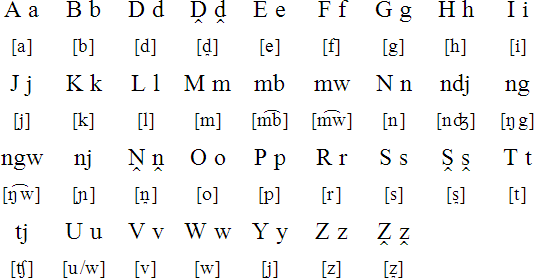Herero is a Southwest Bantu language with around 250,000 speakers in Namibia, Bostwana and Angola. In particular, it is spoken in the Kunene, Omaheke and Otjozondjupa regions in northern Namibia, in the Ghanzi district in western Botswana, and in the Namibe, Huíla and Cunene provinces in southwestern Angola.
Herero is also known as OvaHerero, and Herero speakers call their language Otjiherero, OtjiHimba or OtjiMbanderu, and themselves OmuHerero (singular), OvaHerero (plural). Dialects include Himba, Kuvale, Zemba, Hakawona and Bostwana Herero.
Herero was first written, using the Latin alphabet, at the end of the 19th century by the missionary Gottlieb Viehe, who translated the Bible into Herero. Since the 1960s efforts have been made to standardise the spelling of Herero.
Herero is taught in schools in Namibia as a language of instruction and as a subject. It is taught at the University of Namibia and used on Namibian State Radio (NBC).

Download an alphabet chart for Herero (Excel)
The letters f, l and s are only found in loanwords
Óngèàmǎ n.ómbùngú n.ómbándjè Òngéàmá n.o̍mbándjé vyà zèp.éré óngòrǒ. N.óngéàma̍ àí tjà: “éṱé àtúyètátú twá zèp.á òtjí.pùkà hí; n.ómbùngu̍ ngà rír.e̍ ndjí má.í tù háṋ.én.é òngórò.” N.áí tjà k.òngéàmà: “rí.vàng.ér.á po̍ ru̍.mwè.” N.óngéàma̍ tjí yà múnà ótu̍.mbe̍be̍ra̍ kùtjà tú ṱá pá.mwè, yà ṱ.óma̍.zènge̍ n.ài ve̍te̍ òmbúngú, n.ómbùngu̍ òpu̍ yà pìhúk.ir.à. Ózòmbùngu̍ òpú má.zè zú òkù.ṱéndúna̍.
Lion and Hyena and Jackal hunted together and they killed zebra. And lion said: “we all three together killed this animal; and hyena he should be the one who divides the zebra for us.” And he said lion: “there, choose one.” And when lion saw, that all parts were equal, he died of anger and hit hyena, the he [hyena] become dislocated. This is why hyenas came to limp.
Source: https://archive.org/details/grammaticalsketc0000mohl/page/108/mode/2up
Information about Herero | Phrases | Numbers
Information about the Herero language
http://en.wikipedia.org/wiki/Herero_language
https://archive.org/details/grammaticalsketc0000mohl/mode/2up
https://www.turasafrica.com/the-herero-language
https://www.langcen.cam.ac.uk/resources/langh/herero.html
https://books.google.co.uk/books/about/The_New_Otjiherero_Dictionary.html
Information about the Herero people
http://www.namibian.org/travel/namibia/population/herero.htm
http://en.wikipedia.org/wiki/Herero
Herero phrases
http://www.namtranslations.iway.na/page nine common expressions/otjiherero_page9.pdf
Aka, Bafaw-Balong, Bangi, Basaa, Bemba, Bembe, Bena, Benga, Bhaca, Bube, Bukusu, Bulu, Central Teke, Chichewa, Chokwe, Chuwabu, Comorian, Dciriku, Digo, Duala, Eton, Ewondo, Fang, Ganda/Luganda, Gogo, Gusii, Gwere, Haya, Hehe, Herero, Ibinda, Ikizu, Ikoma, Jita, Kabwa, Kako, Kamba, Kiga, Kikuyu, Kimbundu, Kinyarwanda, Kirundi, Kisi, Kogo, Komo, Kongo, Konjo, Koti, Kukuya, Kunda, Kuria, Kwambi, Lambya, Lingala, Loma, Lozi, Luba-Katanga, Luchazi, Lunda, Luvale, Luyana, Makaa, Makonde, Makhuwa, Mandekan, Maore, Masaaba, Mbama, Mbere, Mbukushu, Mbunda, Mbuun, Mende, Mongo, Mpiemo, Mushungulu, Mwani, Nambya, Nande, Ngoni, Nkore, North Teke, Northern Ndebele (South Africa), Northern Ndebele (Zimbabwe), Northern Sotho, Nyamwezi, Nyakyusa, Nyemba, Nyole, Nyoro, Nyungwe, Nzadi, Oroko, OshiWambo, Pagibete, Punu, Ronga, Safwa, Sena, Sengele, Shona, Soga, Songe, Southern Ndebele, Southern Sotho, Sukuma, Swahili, Swati, Tanga, Tembo, Tonga, Tooro, Tshiluba, Tsonga, Tswa, Tswana, Tumbuka, Umbundu, Venda, Vili, Vwanji, Xhosa, Yakam, Yansi, Yao, Yasa, Yeyi, Zigula, Zinza, Zulu
Languages written with the Latin alphabet
Page last modified: 24.03.25
[top]
You can support this site by Buying Me A Coffee, and if you like what you see on this page, you can use the buttons below to share it with people you know.

If you like this site and find it useful, you can support it by making a donation via PayPal or Patreon, or by contributing in other ways. Omniglot is how I make my living.
Note: all links on this site to Amazon.com, Amazon.co.uk
and Amazon.fr
are affiliate links. This means I earn a commission if you click on any of them and buy something. So by clicking on these links you can help to support this site.
[top]